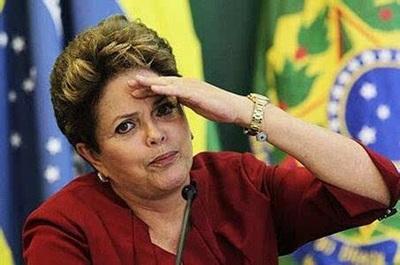By Zhou Zhiwei, executive director of the Brazil Research Center under the Institute of Latin American Studies, Chinese Academy of Social Sciences

The Brazilian lower house of Congress passed a proposal to impeach its president with 367 (over two-thirds majority) members in favor on April 17.
Brazil’s neighboring Latin countries, Portuguese prime minister, Organization of American States and the UN human rights organization representatives have expressed their support for Brazil’s President Dilma Rousseff, criticizing its Congress for forcing an impeachment motion without reliable judicial cause.
According to procedures, the impeachment plan must go through two rounds of votes in the Senate, but Rousseff’s administration seems to have approached “the edge.”
Rousseff’s Workers Party is facing further isolation in the lower house of Congress (and Senate) with many alliance parties in the coalition switching to the pro-impeachment camp.
From the lower house vote, only the Communist Party of Brazil (PCdoB) continues to support the Workers’ Party, which goes beyond a prediction yet reflects the current political struggles in Brazil.
Controversial as the impeachment seems to be, why has it garnered overwhelming support? The answers are various.
Brazilians feel more dissatisfied with a weakening economy since Rousseff took office with average annual economic growth rates in her first tenure, hovering at just 2 percent. In her second tenure, Brazil’s economy fell to the lowest in 25 years and the recession rate reached 3.8 percent in 2015.
Along surging inflation and high unemployment rates, Brazilians favorable ratings for the current administration once has fallen to the single digits, which has influenced the opinions of house members and senators.
The decline of the Workers’ Party gives its opponents a chance to “replace” them.
In 2014, Rousseff won the presidency with a mere 3 percent superiority, and that gave opposition parties a stronger position.
Moreover, rampant corruption in the Workers’ Party had gotten exposed, followed by brutal attacks launched by the media-savvy opposition.
The broken political coalition had sold out on “the balance” between two factions.
After the Brazilian Democratic Movement Party dropped out of the coalition, other medium-and-small scale allies followed suit, which reveals a deficiency of Rousseff to coordinate with her coalition parties, which could be fatal.
The political climate has changed in Latin America, and impacting Brazil.
The economy in Latin America has entered a deadlock overall, and the political stage in favor of left-wing parties is changing to support right-wing forces in Venezuela and Argentina, which encourages strength of right-wing parties in Brazil.
To avoid an impeachment, Rousseff may have two backup plans: first, resign, and second, advance the general elections. Given the status quo, Rousseff can no longer govern.
With formidable attacks from opposition parties, Rousseff’s administration has been paralyzed. Both the preparations for the Rio Olympic Games and tackling an economic slump are destroying her capability to rule Brazil.
However from Rousseff’s previous declaration, resignation is not her trait, since she’s a fighter.
A call for general elections has been brewing in the Workers' Party for a while. It could frustrate the opponents’“coup”, and create a strategic arrangement to avoid “the Workers’ Party getting hurt badly”.
According to Brazilian law, a recall of a general election should be approved by the legislature.
From the situation of the lower house while voting for an impeachment, advancing the general election might be largely supported, even by many senators in favor of the impeachment.
Voice for a reelection is also high in the public.
Yet, it shouldn’t be neglected that in a recent poll, the support rate for Lula (a founding member of the Workers' Party and President of Brazil from January 2003 to January 2011) surpasses that of any other leaders from opposition parties. There’s a possibility for Lula to lead the Workers’ Party if a general election would be called on.
After all, it is still an ambiguous political situation when different forces cooperate and conflict with each other constantly.
Furthermore, Rousseff’s defeat in the lower house of Congress may evoke large-scale protests from left-wing parties and social organizations including from the middle and lower classes. That will cause huge economic social fluctuations in Brazil.
At present, it’s hard to tell where and how Brazil’s political and economic crisis would go. Whether Rousseff would be impeached or not, Brazil’s political climate will go into a long “reset” spell, and that will undermine Brazil’s efficiency in dealing with the economic crisis.
To some degree, Brazil’s political chaos and economic crisis have become “a vicious circle.” Although they are mutual premises, political stability by contrast might be the burning question to solve first.
( The opinions expressed here do not necessarily reflect the opinions of Panview or CCTV.com. )

Panview offers an alternative angle on China and the rest of the world through the analyses and opinions of experts. We also welcome outside submissions, so feel free to send in your own editorials to "globalopinion@vip.cntv.cn" for consideration.















